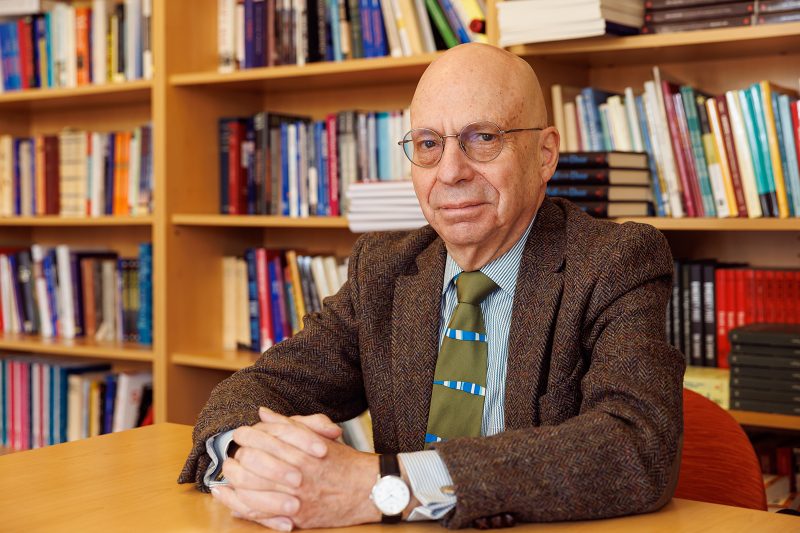In his research, Professor Ian Shapiro is investigating how American democracy became so dysfunctional. He sees weak political parties as a major source of the problem—but also the key to reform.
A Pew research poll conducted in August 2022 found that 72% of Republicans and 64% of Democrats believe people in the opposing party are more dishonest than other Americans; additionally, the poll found that 27% of Americans hold unfavorable views of both political parties.
Americans increasingly distrust political parties because they are “weak,” says Sterling Professor of Political Science Ian Shapiro. Delivering more effective policy and coherent messaging to their constituents, he believes, would strengthen the parties and curb dysfunction in the current political system.
“A strong party is like a cohesive team,” says Shapiro, director of the Leitner Program on Effective Democratic Governance at the Jackson School of Global Affairs. “Everybody has the same agenda and everybody is pulling in the same direction. Everybody has the same goals, and they know what the goals are and what advancing towards those goals requires.”
Research by Shapiro and Leitner Program affiliates has considered numerous reasons for weakened political parties, from the outsized role of unrepresentative activists via primaries and ballot initiatives to influence from well-funded special interest groups. The consequences of these factors have often led to negative outcomes such as lower voter turnout and, more notably, the political rise of more anti-establishment candidates and those who represent the extreme end of the political spectrum.
Underlying all of this is the economy, Shapiro says. The steady decline of industrial jobs, which have generally provided stable income and benefits, has caused many non-college educated, lower income voters to lose trust in the political system that, in theory, should protect them. Many middle class employees are also losing jobs to technology, so that they, too, are experiencing – or anticipating – downward mobility. Shapiro also points out a lingering resentment for the political elite which stemmed from the 2008 financial crisis, when banking institutions received federal bailouts while millions of Americans lost their homes.
“The problem is that governments are not coming up with policies that promote inclusive growth and employment for most of the population,” Shapiro says. “Until they do, people are going to feel angry and disenfranchised.”
Oftentimes, this distrust in government pushes voters to support extreme candidates — creating new political dynamics. In research conducted with Yale postdoctoral associate Christian Cox, Shapiro has investigated the disproportionate influence of extreme voters. Their research has found that candidates in “safe seats” are much more likely to align themselves with these extreme voters than with the goals of their party, knowing there is little consequence for them in terms of votes. Bringing more extreme policy positions to their party makes it harder to create a cohesive agenda, weakening the party.
Working with Yale postdoctoral associate Elizabeth Pfeffer, Shapiro has also conducted research on the role of special interests in party politics, in particular the pharmaceutical industry. According to a 2020 paper published in the journal National Library of Medicine, the pharmaceutical and health product industry spent $4.7 billion on campaign contributions and lobbying in the U.S. from 1999 to 2018 — an average of $223 million annually.
Because political parties are weak, candidates and elected officials are more susceptible to external pressure from special interest group and rely on them to finance political campaigns rather than relying on support from their party.
All of this creates a vicious cycle, Shapiro and colleagues argue. The weaker a political party becomes, the less likely they are to deliver effective policy, further driving voters to extremes — a scenario that played out in the 2016 presidential election.
“It’s not as if in 2016, 63 million Americans were looking for a candidate who would promise to build a wall on the country’s southern border. Rather, millions of working- and middle-class Americans were disaffected by the decades-long failure of both parties to address their stagnating economic fortunes and instead serve the interests and agendas of wealthy elites. [President] Trump saw an opportunity to mobilize their rage behind a populist agenda and acted accordingly,” wrote Shapiro in his 2022 paper “On Political Parties.”
One suggested response from critics has been to decentralize decision-making to give voters more of a say in crafting policy. For example, primary elections are intended to give voters an opportunity to select their party’s best candidate, but Shapiro says that’s not usually the outcome. In practice, primary elections turn out more extreme voters, giving them a disproportionate level of influence over the results. Further decentralization — such as breaking out individual issues for referendums — would create similar dysfunction.
One of the reforms that Shapiro argues for is a reform of the primary system so that if voter turnout is below a certain threshold, a presidential candidate is chosen by party leadership. Shapiro has also argued for more representative voting districts and reducing the parties’ ability to gerrymander.
“Political parties are the central organ of democratic accountability,” says Shapiro. “It is parties that do this work for us and that must compete against one another to put forward the best possible argument that most voters will prefer.”
Problems within political parties are not specific to the United States, Shapiro stresses. In fact, examining the fragmenting of political parties in other countries, both now and in the past, can help inform strategies for repairing American political parties, he says.
“At the end of the day, my research is motivated by improving the quality of democratic governance,” Shapiro says. “We’ve seen democracy threatened before, so we know there is an urgency to understand what’s ailing our democracy and what sort of reforms can be made to make it function better.”
